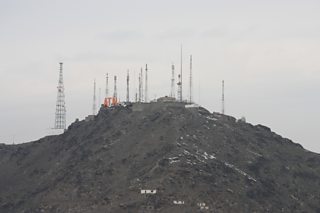Is time running out to save Afghanistan's imperilled media?
James Deane
Director, Policy and Learning
Tagged with:

Kabul’s historic Asmayee mountain - now known as ‘TV mountain’ - bears witness to the proliferation of TV and radio stations in the last decade. But freedoms won over recent years are fragile and in danger of being lost.
That future is avoidable, but it requires clear, focused strategic attention from the international community, a more concerted and united effort by the media of the country itself and a clear commitment from the Afghanistan government. None of these things exist at present.
Afghanistan is in transition, not only to self-government but to a new future. That future will be shaped by its leaders and much will depend on the political settlement that emerges in the wake of that transition.
But the country's future will also be determined by its people. It is the people of Afghanistan who will, through their vote, determine the next government of Afghanistan. It is the people of Afghanistan who will shape its future identity, society and economy. It is the people who, in large part, will decide individually and collectively whether factional tension is or is not resolved through violence.
If the media of Afghanistan continues to evolve as it has over the last decade, the people of Afghanistan will increasingly have access to independent, trusted information. They will have public platforms on which the issues that divide them can be aired, discussed and potentially negotiated.
A media that builds on the successes of recent years would be one where the distinct identities and cultures in society can be a source of celebration and pride, rather than one of conflict and division. Everyone, especially women, could have the opportunity to advance their position in society, culture and politics through the exercise of their voice.
It is very difficult to see how, without such a media, the Afghan people will be able to carve a new national identity, developed through debate rather than conflict, and driven by themselves rather than international forces.
The prospects for such a media are diminishing fast. In the �������� Media Action policy briefing, (launched in May in Kabul this year), we documented both the extent to which the independent media in the country was dependent on international funding and the fact that this funding appeared to be in rapid decline.
Partisan media, also referred to as 'warlord media', which exists to advance the interests of particular factional forces in society, appeared to be growing, becoming more influential, and . We reported the fears of many within the media, particularly women, that the freedoms that had been won over recent years were fragile and in danger of being lost.
The briefing generated a great deal of international attention. Over the past six months, �������� Media Action provided briefings to government ministers, ambassadors, generals, donors, think tanks, media and civil society organisations and many others in Afghanistan and around the world. All those we have talked to have agreed that the future of the media is extremely important to the country’s future but also insufficiently prioritised. As one ambassador put it, “We have developed careful strategies for every aspect of the transition, but we have not considered this one anything like enough.”
Despite this, very little has changed to improve support to the media in the six months since the briefing was launched. There is no mechanism within Afghanistan or internationally to ensure that this issue is considered or debated, and no organisation has an obvious mandate or responsibility to pull together those who might have a common interest in shaping such a strategy.
As our policy briefing explained, the future of the media is tied up with an extraordinary complex and difficult political environment and there are no simple solutions.
Nevertheless, the Afghan government, the international diplomatic community, the security community and the media itself arguably have a shared interest in seeing a media that ensures that Afghanistan's citizens have access to trusted information in forms that resonate with them, and platforms for free, responsible public debate.
For that to happen, all the key stakeholders need to come together to discuss how the future of the Afghan media sector can be secured.
The media of Afghanistan as it has developed over the last decade is a precious, fragile if imperfect achievement, the legacy of substantial international investment. A successful transition in this country depends on that achievement serving as a foundation stone for the future.
Instead, it seems that the most likely legacy now will be a set of neglected and weed-riven ruins.
Related links
(4 MB PDF)
